Psychedelic Therapies — The future of medicine
Innovative, evidence-based approaches for mental health conditions.
The information provided on this page is for informational purposes only and does not replace consultation with a qualified healthcare professional. Psychedelic therapies should only be conducted in controlled environments under specialized medical supervision.
What are psychedelic therapies?
Psychedelic therapies involve the use of specific psychedelic substances — such as psilocybin or MDMA — in a controlled therapeutic setting, combined with psychotherapy, to treat a range of mental health disorders.
When administered in a safe environment under professional medical supervision, certain psychedelics can enhance neuroplasticity, promote deep emotional insight, and support the processing of trauma and dysfunctional behavioral patterns.
Unlike recreational use, psychedelic therapy follows strict protocols with precise dosages, thorough patient preparation, and post-session integration, always led by qualified health professionals.


Conditions treated
Clinical research has shown promising results in the use of psychedelic-assisted therapy for several conditions, including:
- Treatment-resistant depression
- Post-traumatic stress disorder (PTSD)
- Anxiety disorders
- Obsessive-compulsive disorder (OCD)
- Substance use disorders (alcohol, tobacco, opioids)
- Eating disorders
The therapeutic process
Psychedelic therapy goes far beyond simply administering a substance. It’s a structured therapeutic process that involves three key phases:
1. Preparation
Psychotherapy sessions to build therapeutic rapport, set intentions, educate the patient, and prepare them emotionally and mentally for the experience.
2. Substance Session
Administration of the psychedelic compound in a safe, comfortable, and supervised environment. Sessions typically last between 4 and 8 hours, depending on the substance used.
3. Integration
Follow-up sessions to help the patient process and integrate the experiences and insights gained during the session — transforming them into lasting changes in daily life.
Scientific evidence
In recent years, top-tier research institutions such as Johns Hopkins, Imperial College London, and NYU have conducted rigorous studies on psychedelic therapies, with remarkable results:
- Studies with psilocybin have shown remission rates of 60–80% in treatment-resistant depression.
- Phase 3 clinical trials of MDMA for PTSD revealed that 67% of participants no longer met the criteria for PTSD after treatment.
- Meta-analyses indicate that psychedelics show larger effect sizes than conventional treatments across several mental health conditions.

FAQ
When conducted in a controlled environment, with proper patient screening and supervision by trained professionals, psychedelic therapies have an excellent safety profile.
Specific contraindications are assessed on a case-by-case basis during the screening process.
Psychedelic therapies do not necessarily replace conventional medications. In many cases, they can complement existing treatment plans.
Any changes to psychiatric medications should always be discussed and supervised by the prescribing physician.
Patients with conditions such as treatment-resistant depression, PTSD, anxiety disorders, and substance use disorders may be good candidates.
A thorough medical evaluation is essential to determine whether this approach is appropriate for each individual case.


Innovative healthcare solutions for unconventional treatments, focusing on medicinal cannabis, psychedelic therapies and advanced technologies.
Quick Links
Get in touch
- +1 786-480-2830
- commercial@37miles.us
- @thirtysevenmiles
- 37 Miles
© 2025 – 37 Miles. All rights reserved.